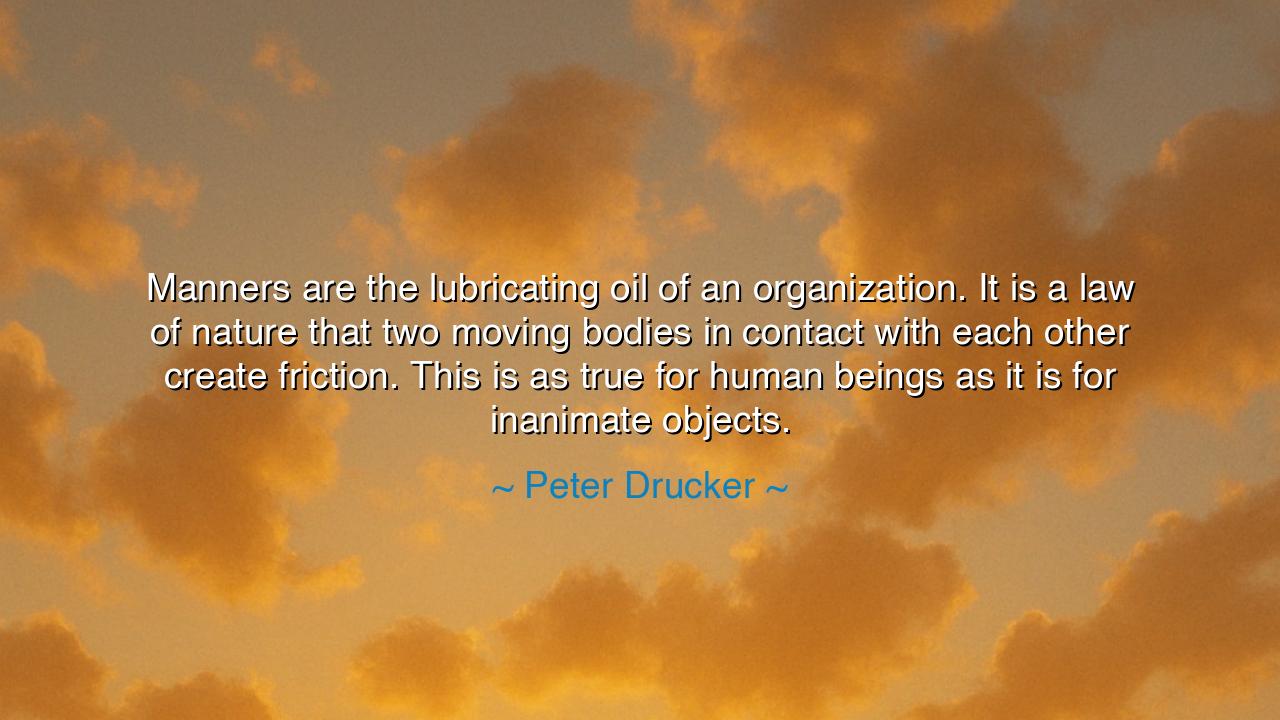
Manners are the lubricating oil of an organization. It is a law
Manners are the lubricating oil of an organization. It is a law of nature that two moving bodies in contact with each other create friction. This is as true for human beings as it is for inanimate objects.






“Manners are the lubricating oil of an organization. It is a law of nature that two moving bodies in contact with each other create friction. This is as true for human beings as it is for inanimate objects.” Thus spoke Peter Drucker, the sage of modern management, who perceived with clarity that institutions are not built upon rules and structures alone, but upon the delicate art of human interaction. In this saying, he weds the law of nature to the ways of men, teaching that just as metal grinds against metal without oil, so too do human beings clash without the gentle buffer of manners.
The meaning is plain yet profound. Wherever human beings gather—in a family, in a city, in an empire, or in an organization—they carry with them their wills, their desires, their ambitions. As stones pressed together produce heat, so the nearness of people produces friction. Conflict, misunderstanding, and resentment are inevitable. Yet Drucker declares that there exists a remedy, a sacred oil that eases the grinding of egos and softens the harsh edges of pride: that remedy is manners. For politeness, respect, and courtesy are not trivial ornaments of culture; they are the very instruments that make cooperation possible.
History offers us mirrors of this truth. Consider the court of Elizabeth I of England, where fierce lords, ambitious nobles, and cunning politicians vied for power. What held the realm together was not only the queen’s authority but the elaborate code of manners at her court. Through ritual bows, measured speech, and the graceful dance of courtesy, rivalries were softened, pride was tempered, and violence was restrained. Without these manners, the court might have descended into chaos; with them, it became a stage where conflict could be managed without bloodshed. This is precisely what Drucker speaks of: manners as the oil that prevents the machinery of human endeavor from tearing itself apart.
The wisdom of the ancients confirms it. The Confucian masters taught that ritual and courtesy—the proper way of speaking, greeting, and behaving—were not hollow gestures but the very bonds of society. Without them, men would act like beasts; with them, they would find harmony. Drucker’s modern words are but an echo of this ancient truth, clothed in the imagery of machines and friction. The law of nature, he says, is universal: where there is contact, there will be friction. But nature also provides remedies. Just as oil allows the wheel to turn smoothly, so too do manners allow people to work together without destroying one another.
There is also heroism in such small acts. To greet another with kindness, to listen without interrupting, to temper criticism with grace—these may seem small gestures, but they are in truth mighty deeds. For they prevent the flames of conflict from consuming the group, the family, the nation. In the great halls of power, wars have been avoided by a single courteous gesture; in the humble office, the spirit of cooperation has been preserved by a word of respect. Thus the warrior may win battles, but the one who practices manners preserves peace.
The lesson for us is both simple and eternal: cultivate manners as diligently as you cultivate skill or knowledge. Do not dismiss courtesy as weakness or vanity. Understand that every interaction is a point of contact, and therefore a point of potential friction. If you would keep your relationships strong, your family united, your workplace harmonious, then let manners be the oil you pour upon them daily. Treat others with respect not only when you agree, but especially when you differ.
Practical steps flow from this teaching. Begin with the small: say “thank you” with sincerity, greet others warmly, listen more than you speak, and restrain the sharp edge of your tongue. In meetings, show patience; in conflicts, show respect; in triumphs, show humility. These are the oils of humanity, preventing the machinery of life from breaking down. Remember that power and intelligence may command, but only manners make cooperation possible.
Therefore, dear listener, take Peter Drucker’s words as a lamp for your path. For in every age, and in every organization, whether vast or small, it is not only law or force that holds people together—it is the quiet grace of courtesy, the steady patience of respect, the golden thread of manners. With these, the great engine of human society may run smoothly; without them, it will grind itself into dust.






AAdministratorAdministrator
Welcome, honored guests. Please leave a comment, we will respond soon